In an industry built to keep her out, Nikki Cameron managed to make her way to the top by betting on herself when the odds were against her. Before becoming one of unscripted television’s most esteemed leaders, she crafted the narratives of the media’s elite through public relations. After laying her foundation in NYC, Nikki reinvented herself in Los Angeles, transitioned industries, and found her way into the room where the power resides.
Fully aware of the pressure and societal standards women are held to, Nikki redirected her path during the COVID-pandemic. Now, a reality TV executive, the former PR associate doesn’t need permission to be in the room, because she oversees it.
Existing on her terms, Nikki refutes the obligation to live on anyone’s preconceived and pointless timeline. And, despite the entertainment industry’s mantra of succeeding by all means necessary, Nikki refuses to step on others to get ahead. Rather, Nikki is guiding the next generation by being the person she wishes she had.
Her Agenda recently spoke with Nikki about Black representation in TV, how to successfully pitch a show, and remaining humble in Hollywood.
Her Agenda: When people want to work in media and entertainment, they often choose between NYC and LA. And, I know you’ve lived in both, so can you please tell us what the difference is between the media industry in both cities?
Nikki Cameron: It’s the vibe that’s really different. Living in New York, the energy, culture, [and] hustle is just a little stronger. You just don’t have a choice but to survive in New York. When I made the decision to transition my career to work in TV, I instantly felt like Hollywood was the place I needed to be rooted in. LA is the city that is known for TV and film. There are more studios, production companies, [and] most of the agencies are out here. LA has the world of entertainment and media, whereas New York is smaller. Like, in New York, the fashion community, architecture, and tech are there.
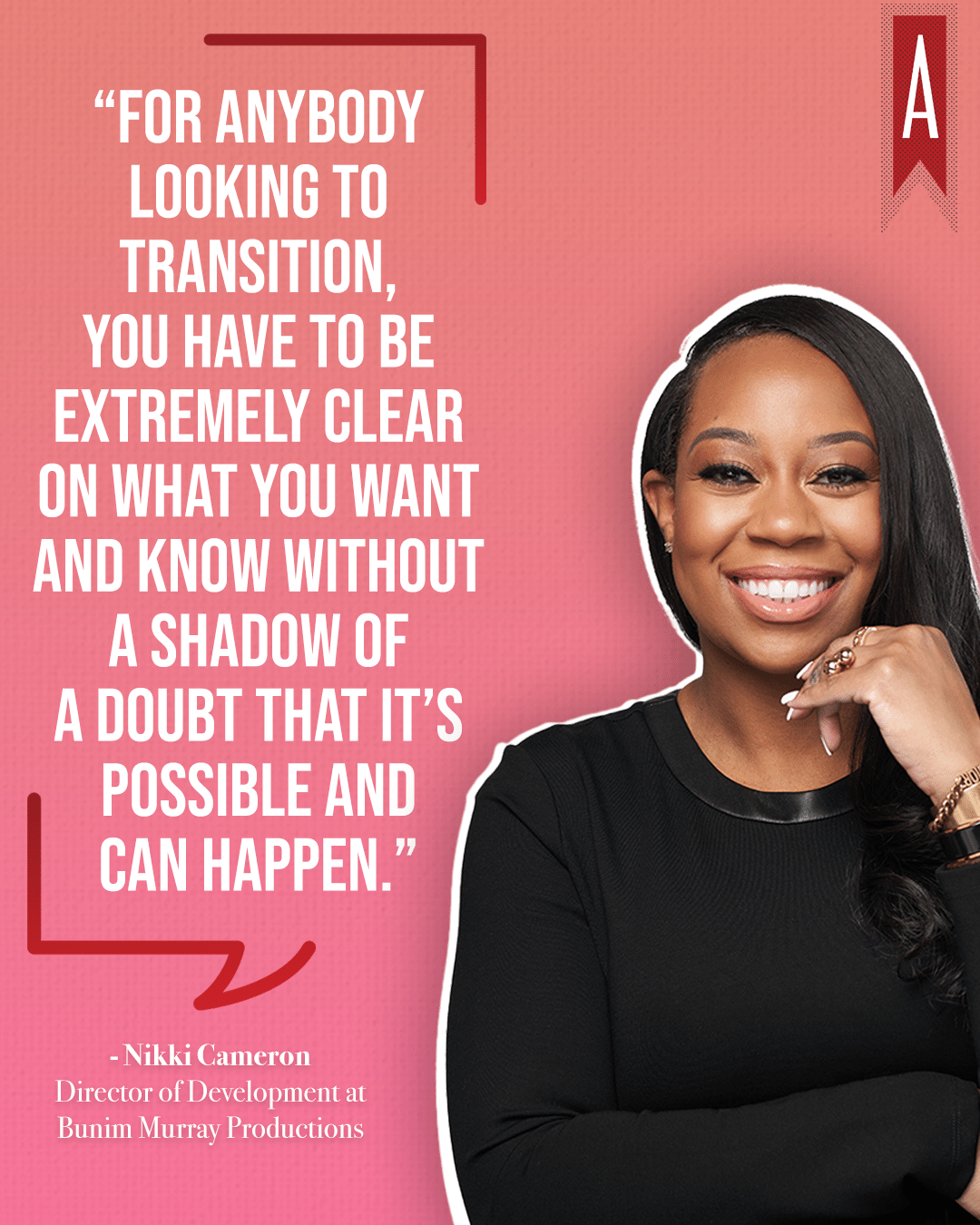
Her Agenda: You used to work in PR and corporate beauty and transitioned into TV. A lot of people, especially women, feel scared to change career paths. What was pivoting like for you?
Nikki Cameron: It was very scary but I was very clear on what I wanted to do. And, that wasn’t a quick decision. I worked in PR and also worked in corporate beauty. When I worked in corporate beauty, I worked in the e-commerce space, so a lot of marketing. It took maybe six months to become very clear on what I wanted to do in the next chapter of my life. Reaching out to people and telling people what I wanted to do was very scary because I cold-emailed [development] executives and tried to set general [meetings]. Some of those phone calls were really good and insightful, and others were like, ‘There’s no way you can enter into this industry. It’s really hard to get into.’
Then, an opportunity became available. And, I had to take a tremendous pay cut. But, again, I was clear. And, it was available for a reason, so I was forced to figure it out. It was something that I wanted to do and I was no longer happy with what I was doing in New York. It just wasn’t serving me, I did not feel fulfilled. [I wanted to] make TV, create content, and figure out a way to develop projects. I was [around] 30, starting over, [taking] a pay cut. For anybody looking to transition, you have to be extremely clear on what you want and know without a shadow of a doubt that it’s possible and can happen. Even if you don’t have a [clear] path, you have to be able to articulate [your goals] to people, and the universe [will give] you the opportunity.
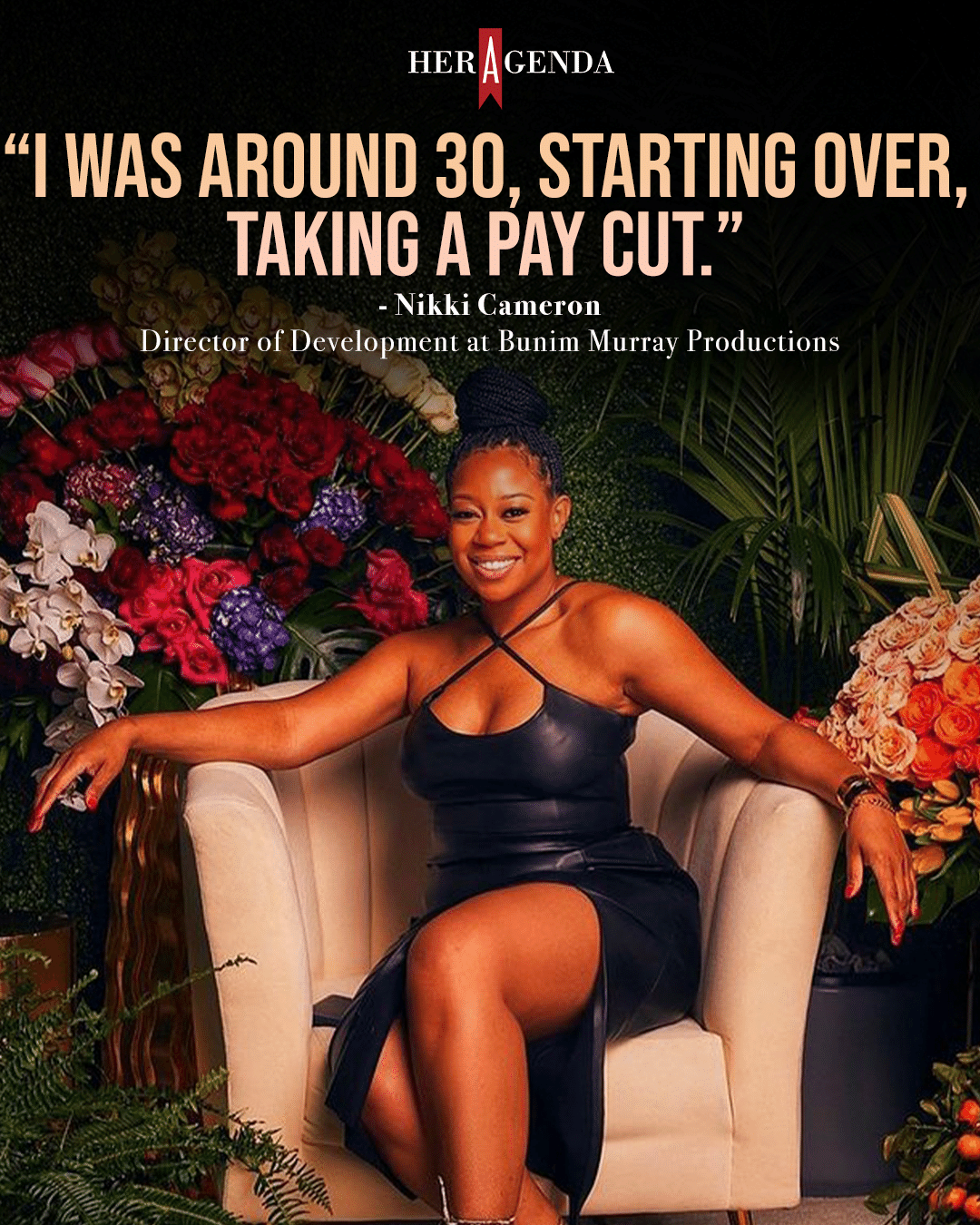
Her Agenda: When it comes to TV, people often say, ‘I just need to make it into the room.’ And, as someone who sits in those rooms as an executive, what is the difference between a pitch that gets greenlit and one that doesn’t?
Nikki Cameron: Two Parts! So, being in the room definitely is a thing. Cause when I first moved out here, I worked in production management but I knew I wanted to work in development. [While] working in production management at NBCUniversal, I was still privy to development meetings. I could say, ‘Can I sit in on this meeting?’ [or] ‘Can I note this cut?’ In that aspect of being in the room, yes, you do have the opportunity to grow your skill set.
As far as buying and selling, currently, I’m on the selling side. I work at a production company, [but] there are two sides to TV. Your buyers are [the] networks and streamers. I work on the selling side. Your sellers are [the] production companies who basically come up with these ideas from scratch, you develop them out, and then you work your ass off to build relationships with buyers [and] network people. [Then] say ‘Hey, I’ve got this great idea, can you take a look at it.’ It’s all relationship-based at its core I believe.
But, then also understand what networks are looking for. They put out these mandates, know what holes they need to fill for programming, and know from research what people are looking for when they’re scrolling [through] Netflix and Peacock. They [say] ‘All of our viewers are women, we know that everyone is watching Love Is Blind, we need more dating shows.’ If [we] know what people are looking for, we won’t develop food shows if the market is hungry for dating or social experiments. You [also] have to make sure that you have a cast and talent that pop. I think a struggle now, in this industry, is people see these influencers [who] have millions of followers but [that doesn’t always] translate to TV.
A third thing is storytelling. What story are you telling? What are these niche communities, and what are things people don’t know or never heard of? What are things [that] you can pull out of these characters that are [equally] entertaining and interesting?
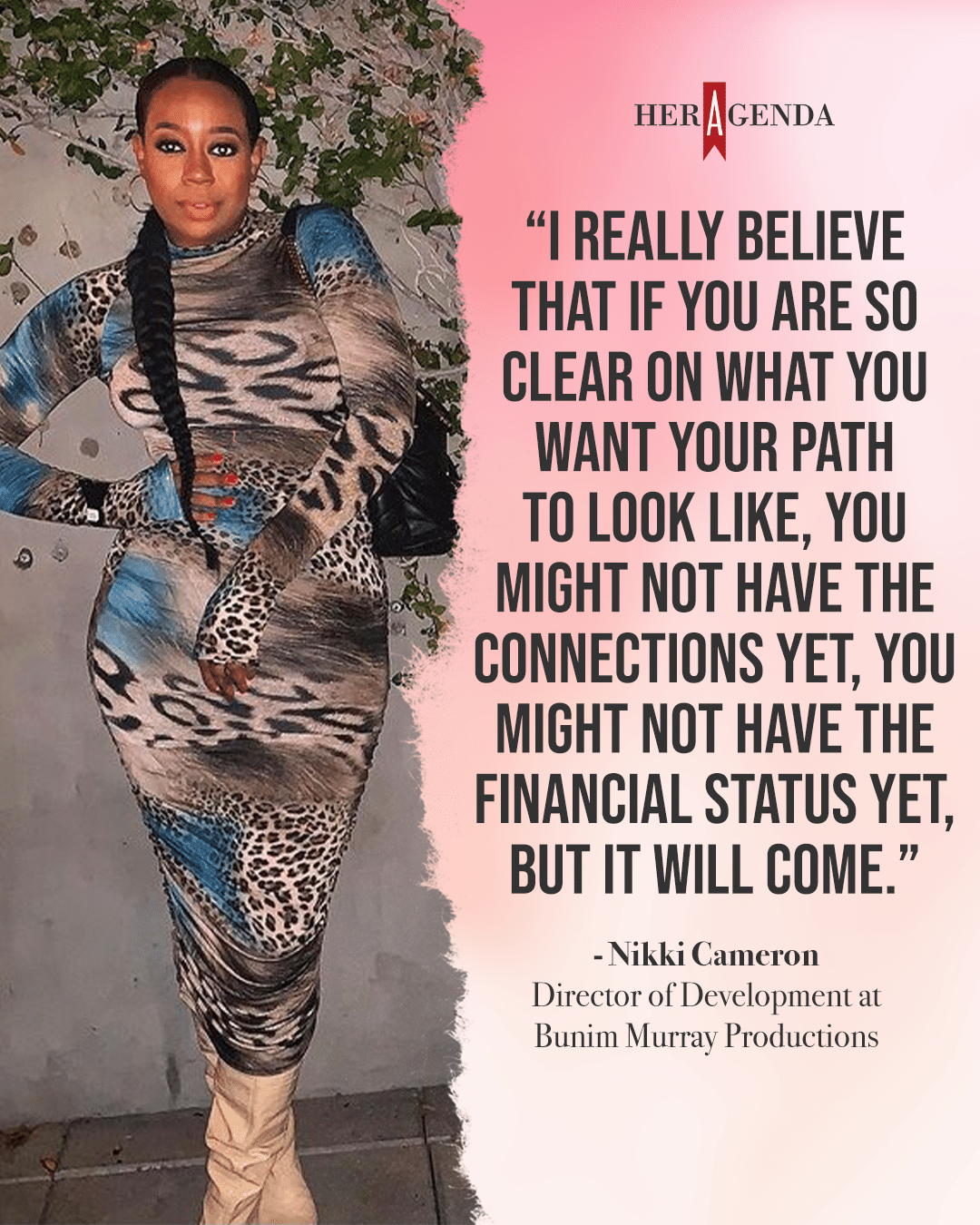
Her Agenda: You work in unscripted TV and I felt like you were the best person to ask about this. What’s your opinion on the way Black people are presented on reality TV?
Nikki Cameron: Sometimes it’s good, sometimes it’s bad. You [have] to know that [you’re] being cast on a show because you have something to give and viewers want to take something home whether it’s negative or positive. It can be a slippery slope. For my company, we really pride ourselves in telling true stories that don’t shed [a] negative light on people but [are] very uplifting. Have Black women been presented in the best light all the time? Probably not. But, we do have a responsibility to make sure our voices are heard and that we are being presented in a proper way. We have to be very vocal in what we want to portray.
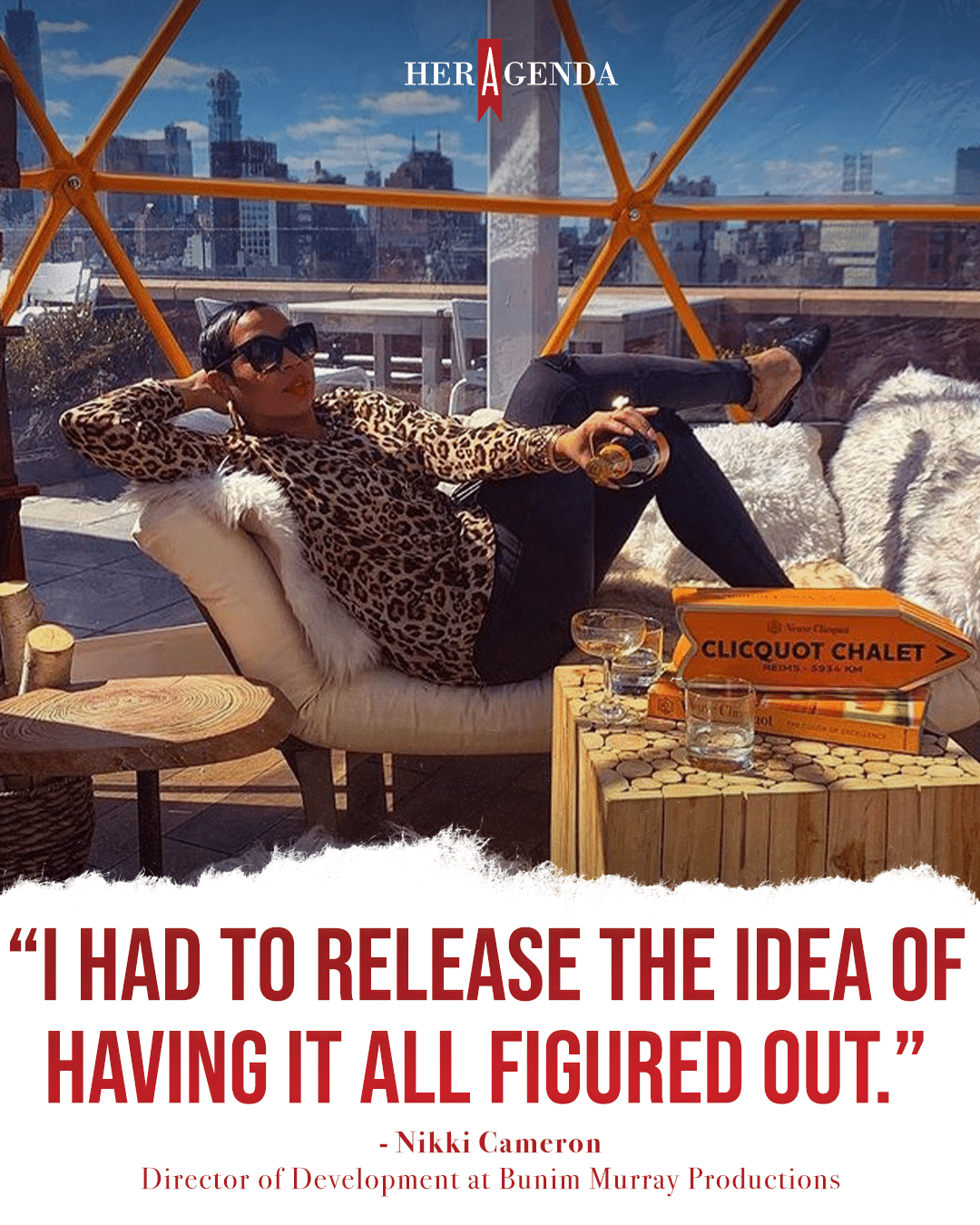
Her Agenda: I really want to talk about reinvention in your 30s. I, along with so many other women, feel like we have to accomplish everything by 25. And, you are honestly just getting started. How did your reinvention come to be?
Nikki Cameron: I think during the pandemic, [my] ‘aha moment’ [was] you’ll never figure it all out. I really believe that if you are so clear on what you want your path to look like, you might not have the connections yet, you might not have the financial status yet,but it will come. I didn’t know [anybody] that worked in development. I trusted that the universe was [going to give it] to me. I had to release the idea of having it all figured out. Even in New York, I compared myself to friends [who were] making more money than [me]. There is a really good book called, ‘Ask and It Is Given’ [that I recommend]. Feel good about all that you do, and even if you haven’t accomplished [something] yet, know that it is still coming to you. Especially being 34, you still want kids, you want to get married and all that stuff, [but] I had to get rid of [that] idea. I’m living my best life and I know those things will come.
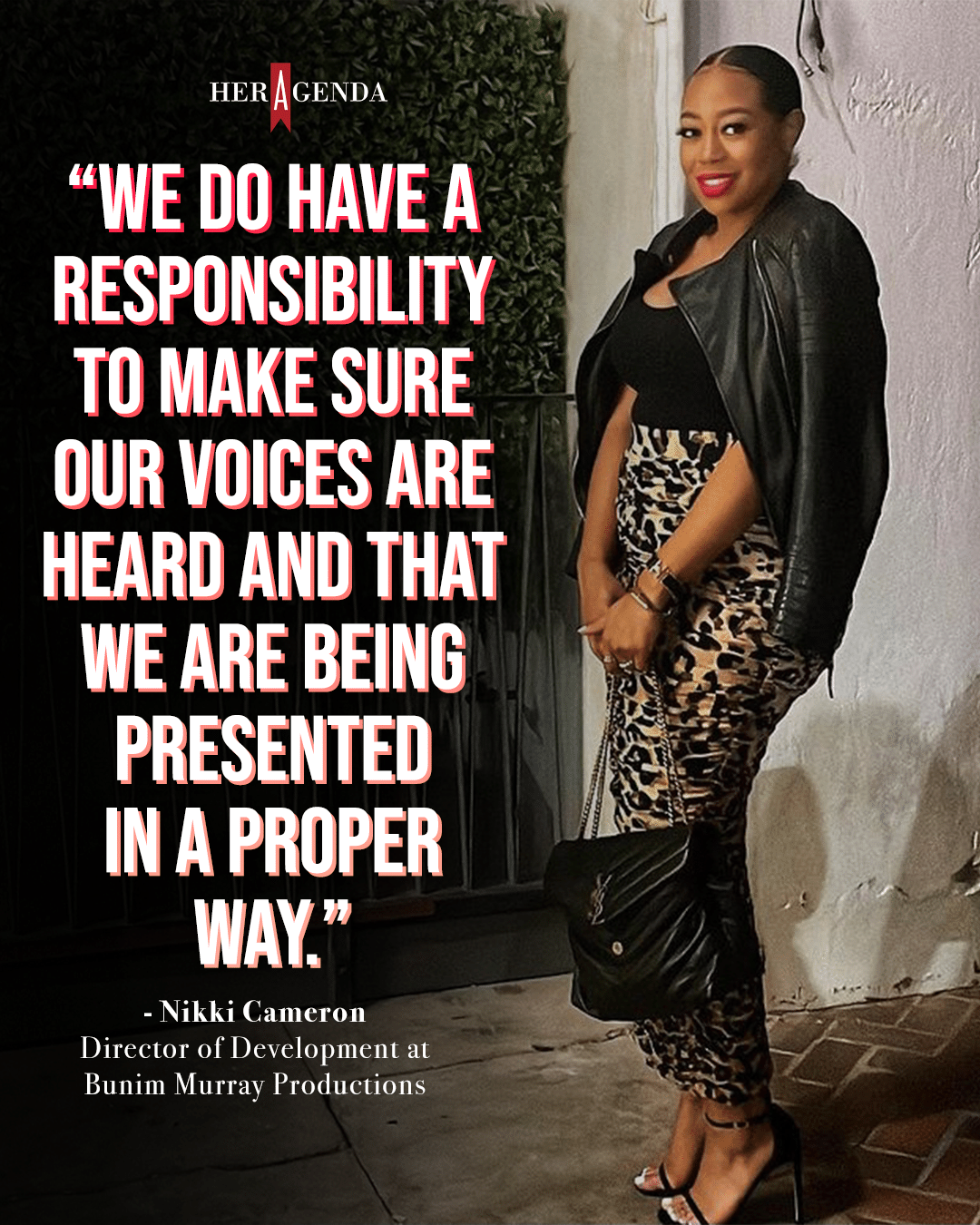
Her Agenda: We see you on Instagram going to Oscars parties, but in person, you’re still a down-to-earth, country girl. How have you been able to remain humble in Hollywood?
Nikki Cameron: First of all, I start my day with a sermon. Like, when I’m getting dressed. I think it’s so cool [to] have the discipline to start [your] day with something positive. Every morning when I wake up, I’m listening to something positive, that makes me feel good, and reminds me that nothing bad can come to me. What you feed yourself, what you hear, and what you listen to, are all intentional. I have the discernment to be intentional about what I digest. At my core, I’m also just a nice person [and] I always want to help people.
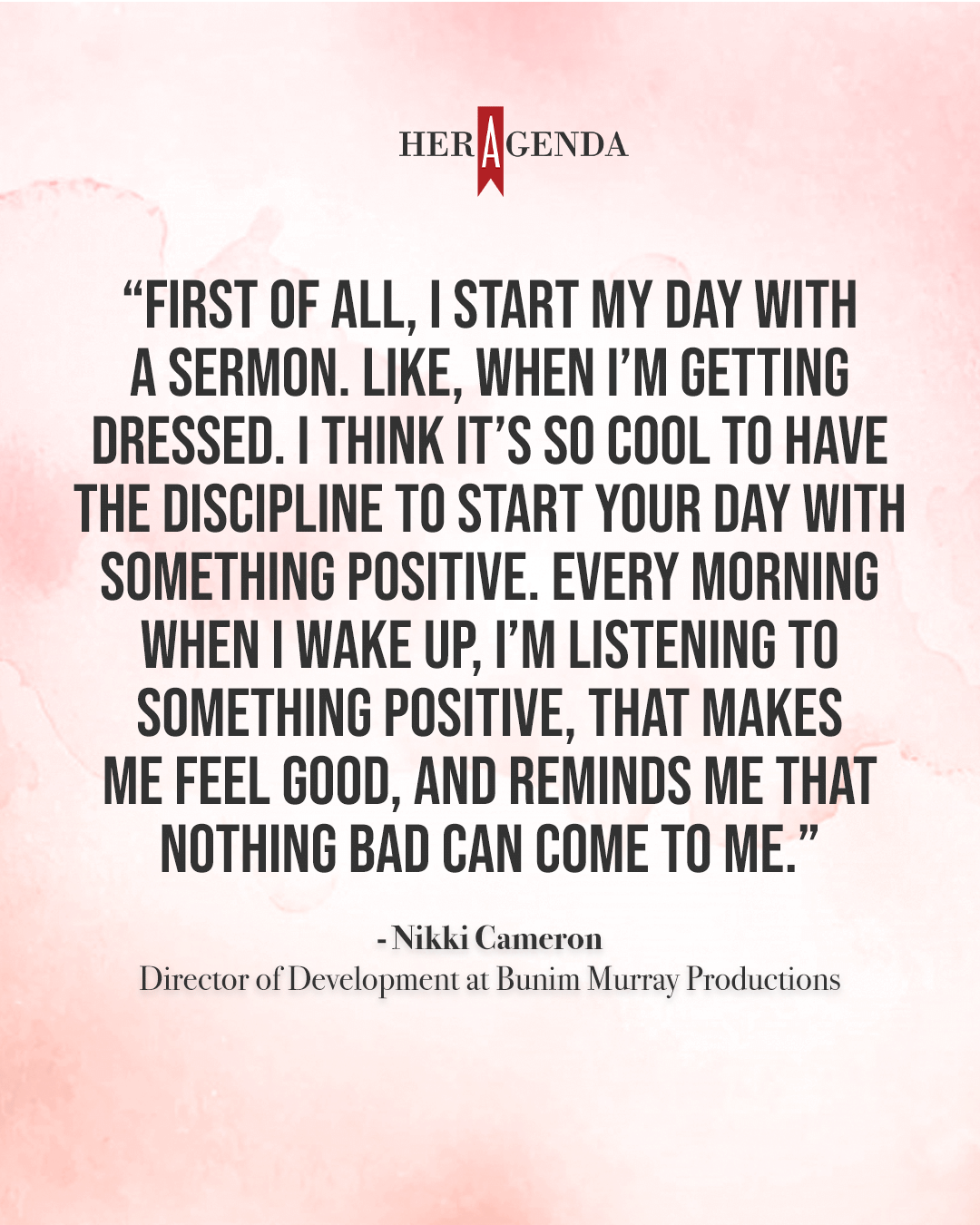
Her Agenda: Lastly, let’s discuss your role as ‘Director of Programming’ at Gyrl Wonder, which I am a member of. So many people in Hollywood want to help and there are many who don’t. Why is helping the next generation a part of your purpose?
Nikki Cameron: Because I didn’t have that. I literally did not have [anybody] guiding me into my career. I remember graduating from college, [thinking] ‘What do I do next?’ I remember thinking, ‘I like Rachel Roy clothing,’ and I literally went to Rachel Roy’s website, and [there] was like a ‘contact us’ form and I filled it out saying [something like], ‘Y’all looking for interns? I would love to come to New York and intern for y’all!’ and they literally called me. I didn’t have anybody to tell me how to do it. After college, I was just like, ‘I guess [I’ll] go back home but I have this desire to work in entertainment and do something cool.’ Nobody taught me how to write a cover letter [or] a resume. It was just me doing a Google search. I didn’t have that help and I think it’s important because some people have a one-up and that’s not always fair. Sometimes, you just need someone to [say] ‘You’ve got it.’








